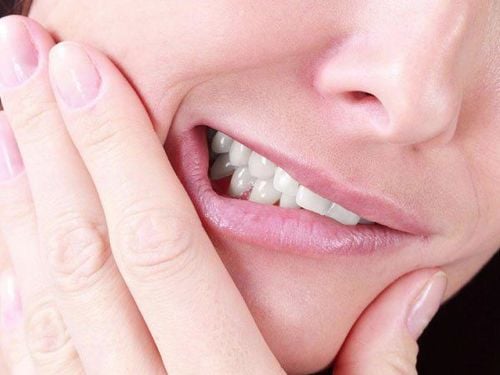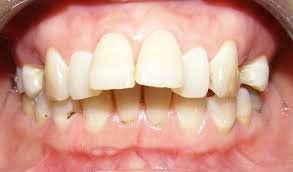This is an automatically translated article.
The article was professionally consulted by Specialist Doctor I Nguyen Trung Hau - Doctor of Odonto-Stomatology - Department of Medical Examination & Internal Medicine - Vinmec Da Nang International General Hospital.Teeth grinding during sleep is a fairly common condition in both children and adults presenting a disorder in the body. Although it is not a serious disease, it can cause discomfort to the patient and those around him, leaving serious consequences if no definitive and timely treatment measures are taken.
1. Causes of teeth grinding

Tác dụng phụ của thuốc chống trầm cảm là nghiến răng khi ngủ
Usually, if you grind your teeth while sleeping, you can't detect it yourself, but you have to rely on people around you. The cause of this phenomenon may be due to:
Psychological factors: People who are always in a state of nervous tension, excessive anxiety, too much stress or aggressive, strong personality are easily crushed. teeth while sleeping; Due to sleep disorders: Some scientific studies have shown that people with sleep disorders are often associated with sleep apnea syndrome, hallucinations, sleep paralysis and teeth grinding; Due to the habit of using drugs to treat: Sometimes bruxism when sleeping is caused by the side effects of some antidepressants, tranquilizers... Due to pathology: Teeth grinding may be caused by the patient's condition. previous diseases such as Parkinson's disease, gastroesophageal reflux disease, etc. In addition, bruxism during sleep can also be caused by misaligned teeth and inappropriate bite.
2. Who is prone to grinding their teeth while sleeping?
Anyone can get bruxism while sleeping, however, children are the most susceptible. The frequency of teeth grinding decreases with age. Explaining this, specialists think that it may be because in children the neuromuscular system is not yet complete and prone to sleep disorders as well as psychological instability, easily affected by the environment. around.In children, bruxism usually appears when the child is about 1 year old and has developed the front teeth. In particular, children who have mouth breathing problems or have respiratory infections, asthma, tonsillitis, attention deficit hyperactivity syndrome or school-age children and face high pressure in school. studying... has a higher rate of teeth grinding while sleeping.
3. Harmful effects of prolonged sleep grinding teeth
Most cases of people grinding their teeth while sleeping are usually not dangerous to health, however, the consequences of teeth grinding while sleeping will be unpredictable if this situation is prolonged and there is no intervention.In fact, most people who grind their teeth will not fully understand the harmful effects of grinding their teeth while sleeping, so they are subjective and let this situation continue from day to day. Depending on the condition, severity and frequency, bruxism can cause the following consequences:
Causing painful, annoying sounds, affecting the sleep of the person next to you; Teeth grinding while sleeping will create strong contact of the upper and lower teeth, causing them to wear down, lose all enamel, become dull, cause sensitivity, fracture of teeth, loose or broken teeth. In particular, when teeth are worn a lot, it will reduce the size of the lower face and make the patient look older; Teeth grinding for a long time causes the jaw muscles to contract strongly and causes muscle pain, fatigue, headache, and neck pain as a result. When this condition becomes severe, the patient may have hypertrophy, facial disproportionate; Causes temporomandibular joint disorders.

4. How to overcome teeth grinding while sleeping?
If the condition of teeth grinding while sleeping is mild and newly acquired, the patient only needs to adjust his habits and behavior to overcome the condition without requiring treatment. However, in the case of prolonged, severe teeth grinding, it is necessary to go to the hospital for a specialist to conduct an examination, assess the situation and prescribe an appropriate treatment plan.The goal of treatment of teeth grinding while sleeping is to help the patient relieve pain, reduce the impact on teeth and restorations, temporomandibular joints, and at the same time, minimize teeth grinding. Patients can use therapy, drugs or dental intervention depending on their own condition.
Usually the doctor will treat the patient's psychological stress, at the same time treat the sleep disorders (if any) and advise the patient to maintain healthy habits to improve the condition. Teeth grinding such as going to bed on time, limiting the use of caffeinated beverages, alcohol before going to bed, facial massage...
Along with psychological treatment, the patient will need to change their exercise habits move the function to adjust the function to its correct position.
Change the jaw movement habits and adjust the jaw to the appropriate position, the adjustment of the jaw will take a long time, so the patient needs to be patient.
Use medication to treat bruxism while sleeping: Although drug treatment does not really bring the desired effect, it can help patients reduce excessive muscle tension caused by teeth grinding. In some special cases, patients can be injected with botox to treat when teeth grinding is severe and does not respond to treatment.
In addition to the above remedies, dental interventions can be used to protect the teeth from the wear and tear caused by teeth grinding. Currently, on the market, there are several types of anti-bruxism trays that also work to correct jaw movement habits and limit teeth grinding while sleeping in patients.
In summary, teeth grinding is a fairly common condition, although it is not as life-threatening as many other diseases, but if the condition persists for a long time, it will also cause serious consequences for the patient. . Therefore, it is necessary to monitor and take timely intervention measures when suffering from bruxism while sleeping.
Please dial HOTLINE for more information or register for an appointment HERE. Download MyVinmec app to make appointments faster and to manage your bookings easily.













